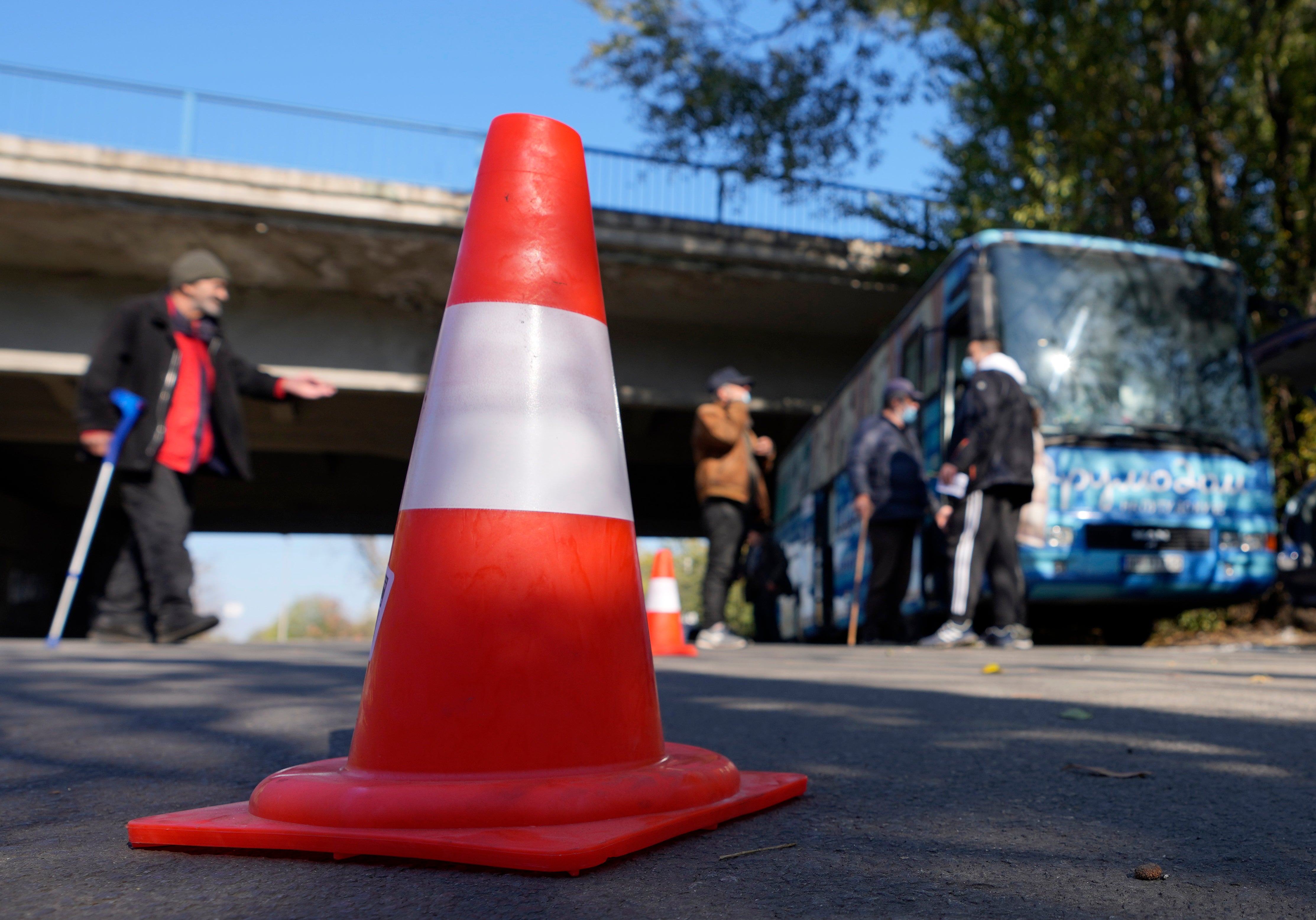Belgrade's homeless can shower, get aid in mobile bus center
Standing close together on a sunny autumn day, a group of people wait patiently by a blue bus parked beneath a bridge in Belgrade

Your support helps us to tell the story
From reproductive rights to climate change to Big Tech, The Independent is on the ground when the story is developing. Whether it's investigating the financials of Elon Musk's pro-Trump PAC or producing our latest documentary, 'The A Word', which shines a light on the American women fighting for reproductive rights, we know how important it is to parse out the facts from the messaging.
At such a critical moment in US history, we need reporters on the ground. Your donation allows us to keep sending journalists to speak to both sides of the story.
The Independent is trusted by Americans across the entire political spectrum. And unlike many other quality news outlets, we choose not to lock Americans out of our reporting and analysis with paywalls. We believe quality journalism should be available to everyone, paid for by those who can afford it.
Your support makes all the difference.Standing close together on a sunny autumn day, a group of people wait patiently by a blue bus parked beneath a bridge in Belgrade This will be a rare chance for them to have a shower, wash their clothes or get a medical checkup.
Three times a week, a humanitarian organization working in Serbia opens up its mobile bus center for the homeless, offering basic services and help to some of the thousands living and sleeping rough in the Balkan country's capital city.
The project of the Adventist Development and Relief Agency has developed gradually over the past four years. But it has grown in importance since the start of the coronavirus pandemic that has pushed already vulnerable communities further to the margins.
Igor Mitrovic, executive manager of the ADRA group that is behind the project, estimates that there are 7,000 homeless people in Belgrade alone.
“(Homeless people) are now even more exposed,” he said.
Routinely afflicted by chronic diseases, mental health problems or substance abuse, homeless people in Belgrade in most cases have no documents and live under the state radar. ADRA aims to discover as many as possible, offer immediate help and try to get them back into the system in the long run, Mitrovic said.
“They have been, almost all of them, abandoned by society,” he said. “They ended up without IDs, without any link with the system of health care or social welfare.”
While the sight of homeless people sleeping in parks and streets is common in most world capitals, in Serbia it emerged relatively recently, after the 1990s' violent breakup of the former, communist-run Yugoslavia and the postwar transition.
Mitrovic said Belgrade's homeless thus mostly are people in their 50s and older, who have found themselves lost in the chaos of the economic destruction that followed the Yugoslav wars and the collapse of the socialist-era welfare state.
“We have around 1,000 people (whom) we are trying to relatively regularly assist on a daily basis, and maybe 2,000 whom we, at least once a year, assist in some way to reduce the negative consequences of living in the street,” said Mitrovic.
A city of 2 million, Belgrade has a city-run shelter but its 100 places normally are fully booked well in advance, and are far from enough. Authorities have promised to open an additional shelter and have set up temporary facilities in various parts of the city.
Part of the international ADRA network, ADRA in Serbia has worked on the bus project in partnership with the Belgrade city authorities and the United States and Slovak governments through USAID and SlovakAid agencies, Mitrovic said. The bus dubbed “Drumodom," which roughly translates “Roadhome,” is envisaged as a temporary stop on the “way back home” for homeless people.
“That’s the first objective, to protect their health, to try to find some shelter or to advocate for them with the government shelter for them to get accommodated,” said Mitrovic. “And secondly, more importantly, to find some long-term or mid-term solution.”
Already without income, vulnerable groups such as the homeless have found their options even more limited during the COVID-19 pandemic that increased existing social gaps, Mitrovic explained. This has added to their isolation, particularly during the near-total lockdown period last year.
“Even those minimal opportunities on the edges of social life like collecting something or using any kind of secondary waste to be resold, got reduced dramatically," Mitrovic said.
Slavko Antonic, 64, who said he is a former pilot from Bosnia, told the AP that pandemic restrictions have prevented him from returning home to the northwest town of Prijedor where he has a small disability income after being wounded during the 1990s war.
Showing what he said was a a copy of his Bosnian ID, Antonic said he now has no money or way to travel, and lives in an abandoned camping trailer without electricity or running water. A restaurant nearby sets aside leftovers and he can keep clean thanks to ADRA's bus, Antonic said.
“I have given up, I never thought I would ask people for money, but I do now and good people give me some,” he said. “I feel I can no longer remember who I am."